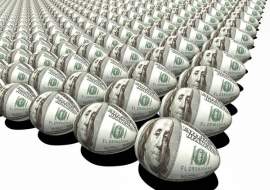
What You Didn't Know About Exchange Rates

What are Exchange Rates?
Exchange Rates are rates that are applied to currency; currency is another classification for the wide range of monetary systems in circulation. Exchange rates are defined by the innate value of an individual currency with regard to others in circulation. Currencies maintaining higherexchange rates may allow for an individual acquiring that currency – in exchange of another currency – to receive a larger amount of a currency with a higher exchange rate. Conversely, currencies with lower Exchange Rates may allow for a subtracted amount of that currency received upon exchange.
A Practical Example of Exchange Rates
Although seemingly complex, Exchange Rates can be explained in far more simpler terms:
A Scenario Illustrating Exchange Rates
On April 3rd, 2009, the following illustrates the Exchange Rates shared between the United States Dollar (USD) and the Indian Rupee (INR):
One United States Dollar, which will be referred to as ‘USD’, is equivalent to 49.89 Indian Rupees – Indian Rupees will be referred to as ‘INR’ for the purposes of this example.
In the event that an American traveled to India and wished to exchange the USD – with regard to applicable Exchange Rates – for the INR - approximately 50 INR were equivalent to 1 USD; upon exchanging 5 USD, the American traveler would expect to receive approximately 250 INR.
On May 7th, 2010, the following illustrates the Exchange Rates shared between the United States Dollar (USD) and the Indian Rupee (INR):
That same American traveler wishes to return to America on May 7th, 2010, whereas the applicable exchange rates between the USD and the INR had since declined subsequent to April 3rd, 2009; the then-current exchange rate was 45.41 INR for every USD.
Upon exchange the initial 250 INR with the hopes of receiving 5 USD, the American traveler will find that as per the actives exchange rates in India, 250 INR is equivalent to 227.05 USD; 23 USD less than the initial amount possessed.
Uses for Exchange Rates
As per the previous example involving the fluctuation of exchange rates, individuals undergoing currency exchanges with regard to international monetary systems are subject to either gains or losses with respect to the applicable exchange rates; as a result, the following activities have arisen in conjunction with the notion of exchange rates:
Exchange Rate Trading (FOREX)
Akin to the act of investing and trading stocks, the act of trading currency is similar in the implementation of value fluctuation with regard to rendering financial losses or gains. FOREX, which is a colloquialism for the term ‘foreign exchange’ is the systematic activity of exchanging various forms of currency within a setting of a commercial market.
Foreign Exchange Market (FOREX Market)
Existing both in physical and virtual forms, the marketplace used by traders is commonly referred to as the FOREX Market; with regard to the dynamic of exchange rates, international currency is exchanged between individuals interested in the monitoring of the behavior of that currency – in conjunction with the stock market, there exist a wide variety of observable trends and patterns with regard to the valuation of foreign currency and exchange.
NEXT: Liquid Asset Explained





















